Millions of its readers believe The Guardian offers critical, independent reporting that is different to the right-wing, billionaire-controlled UK media. But its limited coverage of British foreign and security policies gives a misleading picture of what the UK does in the world. The paper is in reality a defender of Anglo-American power and a key ideological pillar of the British establishment. Mark Curtis: Like billionaire controlled media, The Guardian misinforms its readers …
Some things can be filed under funny if you’re in a good mood. Look at the way our opinion manufacturing media, and those whose brains they wash, show a one-sided understanding of ‘whataboutery’. 1 Here’s a classic of its kind, encountered three years ago on Facebook.
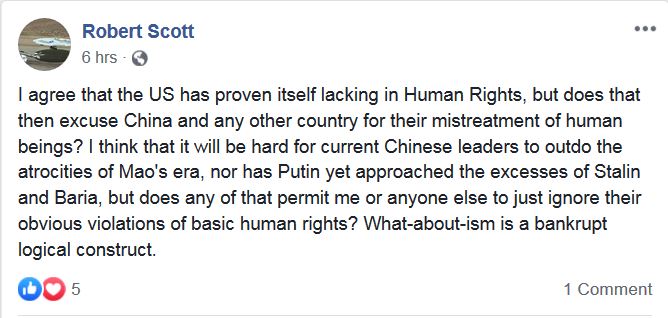
The irony is exquisite. As is the lack of self awareness. Here’s a man committing, in the opening sentence of a one paragraph post, the very sin he damns in its closing sentence.
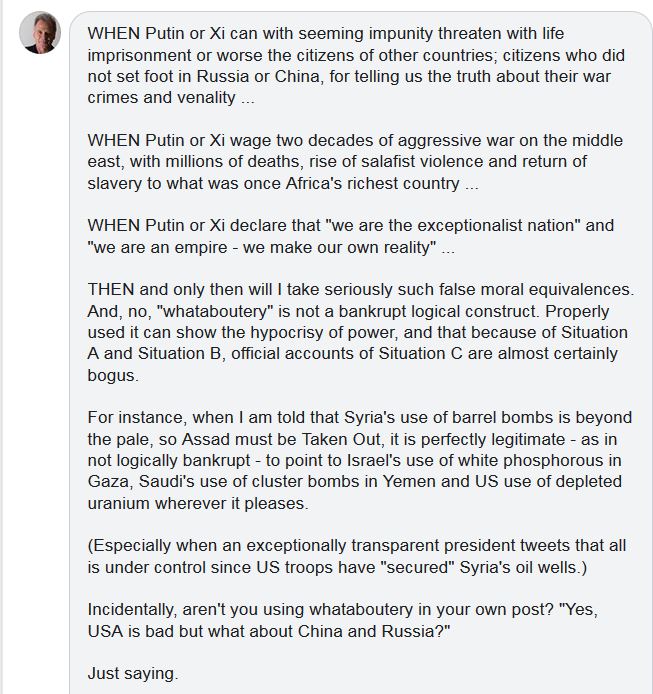
Fair play to Robert Scott. At least he kept his whataboutery brief. The same cannot be said of Simon Tisdall’s Observer column of March 26. Yet for all its bombast and sneering prolixity, I ask you to bear with me as I respond. As well as being one long exercise in whataboutery, the piece is as perfect an example as ever I laid eyes on of just what Mark Curtis was getting at in the quote I opened with.

America’s record at keeping global order is deeply flawed, but the only winners from its drift towards isolationism will be Xi Jinping and Vladimir Putin
I beg to differ. While systemically corrupt media – their financial wing in particular – heap pot, kettle, black accusations on the alleged debt-trap of China’s infrastructure development loans in the global south, reliable academic sources show these to be lies rooted in assumptions that “they” will behave as badly as “we” do. As I put it in a footnote to a post on Ukraine:
A renascent Russia, and China’s Belt & Road, open up the possibility (for now I’ll put it no more forcefully) of a prosperity denied the global south for centuries under colonial rule, and for decades under the debt-trap controls of modern [i.e. financial] imperialism. IMF conditionality makes development loans (to bring recipient states into the global value chain as semi-colonies) subject to ‘market reforms’ which open up nationalised sectors to the investors of Frankfurt, London and New York. And should such financial discipline not suffice? Or, in the oil rich Ba’athist economies of the Middle East, be inapplicable? Then other means may be called for: infanticidal sanctions and, ultimately, the casus belli by which armed intervention is given a veneer of ‘humanitarian’ or ‘self defence’ legitimacy. But the rise of a multipolar world, led for now by a China whose approach to prosperity rests on a very different model to that of Wall Street – see Why read Michael Hudson? – offers a ray of hope to the global south even as it threatens to call time on the West’s larceny.
Simon Tisdall’s opening paragraphs tell us that:
American global leadership took a serious kicking last week. Politicians and pundits on both sides of the Atlantic queued up to condemn George W Bush’s and Tony Blair’s disastrous invasion of Iraq 20 years ago this month. At the same time, Congress moved to repeal the war powers act that enables a US president to launch military interventions abroad.
In Moscow, meanwhile, Xi Jinping, stringing along his Russian puppet, Vladimir Putin, proposed a new global order to replace the post-1945 US-led model. China’s de facto dictator is generously offering to “stand guard” over the planet. In Xi’s brave new world, subservience and surveillance replace shock and awe. Democracy takes a back seat.
Credit where it’s due, Mr Tisdall. Calling Russia’s president a puppet, as opposed to the latest “new Hitler” …
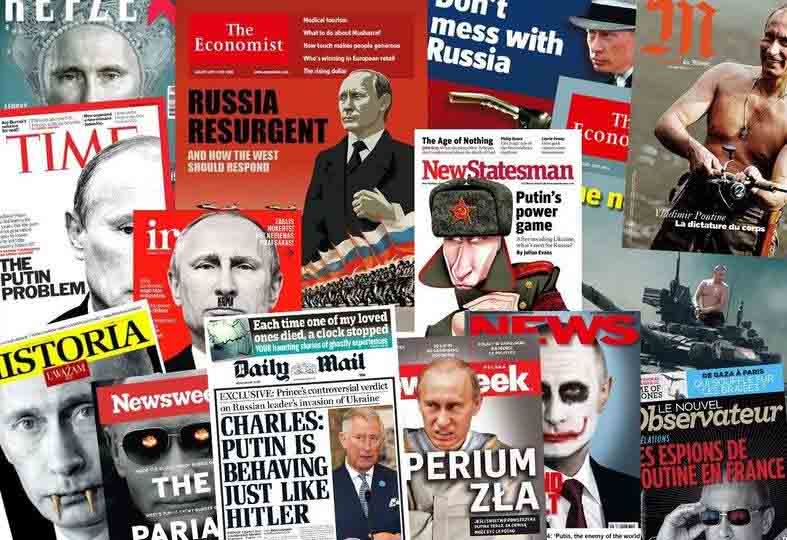
… has a certain novelty value. Maybe that passes for originality in your circles. By which I mean circles in flat denial of the stark staringly obvious truth that:
The USA rings the planet with 800 military bases, outspends on weaponry the next ten spenders put together, has been at war for almost its entire history and has slaughtered millions – by bombs, invasions, murderous ‘sanctions’ and terror unleashed – in this century alone. Mostly in far off lands.
In what universe can anything remotely similar be said of China or Russia?
Me, I draw a line between originality – which to my mind and in this context implies deep and clear thinking, allied to engagement with factuality – and mere novelty value. But original or not, you offer zero evidence for your depiction of Mr Putin’s status vis-a-vis Mr Xi.
By contrast there’s a slew of evidence of the puppet status of British leaders (with Julian’s plight a small but significant case in point) and their EU counterparts – witness Washington’s war in Ukraine, aimed as much at weakening Europe as bogging down Russia, yet avidly prosecuted by Scholz, Macron et al.
But these things appear to have passed you by. No small omission, I say, for one holding forth in such Gladstonian tones on global realpolitik. So what do you suppose Dr Kissinger had in mind, Simon – may I call you that? – when he remarked that “to be an enemy of the US is dangerous, but to be a friend is fatal” ?
That Iraq was a catastrophic, avoidable own goal is no longer plausibly disputed. Numerous prior warnings went unheeded. Yet similarly shortsighted are present-day attempts, from the far right and left, to use that debacle to discredit US-led interventionism in general and celebrate the consequent decline of American influence.
Again to give you your due, Simon, you did indeed oppose the invasion of Iraq. See the first link of the above paragraph. But the gist of that opposition – here again is the link – is that the forthcoming war on Iraq would be a mistake. Neither at the time nor since have you examined how that war served Washington and Wall Street at the expense of so much terrorising chaos, so many corpses.
Specifically, you are silent on:
- The revelations by General Wesley-Clarke that Washington, riding a wave of sentiment manufactured after 9/11, 2 saw Iraq as the first of five Middle East 3 countries targeted for regime change.
- The looting of Iraq’s economy as documented in Naomi Klein’s Shock Doctrine. 4
In sum you are silent, as is your employer, on the existence of a US empire unsurpassed in the planetary scale of its rapacity, fuelled by doctrines of exceptionalism, full spectrum dominance and Project for a New American Century.
On this and much besides I’m with Caitlin Johnstone:
If your understanding of world events doesn’t account for the easily quantifiable fact that the US is the most tyrannical regime on earth by a massive margin, nothing else in your understanding of world events will be fact-based.
You continue:
The Middle East shows what happens when the US disengages or drops its guard. The 2011 Iraq withdrawal foreshadowed a decade of terror and civil war in Syria, Iranian hardliners running riot, erstwhile Saudi allies on a killing spree in Yemen, Afghanistan sunk in betrayal and misery and Israel-Palestine in rudderless chaos.
No, Simon. The US never ‘disengaged or dropped its guard’ in Syria, as can be ascertained from perusal of – ta da! – The Guardian, two days before your own post!
In the interests of brevity I’ll pass over the other breath-taking claims made in the paragraph. All can be filed, for their standing of causality on its head, as wet streets cause rain howlers. For at least two decades it has called for a colossal act of faith – aided by you and your fellow empire denialists at Guardian Media Group – to see the US presence in the Middle East as (a) more or less well intended and (b) having in the main Good Outcomes. Now so stubbornly perverse a view calls for preternatural levels of delusionality.
“What would have happened if the US had failed to act after Saddam Hussein invaded Kuwait in 1990?” asked veteran analyst Bill Schneider recently. “Most likely, nothing.” After Europe froze in horror, it fell to the US to lead a coalition to end the Bosnian war.
Leaving aside the colonialists who, as the sun set on the Ottoman Empire in the wake of WW1, carved up Arabia into balkanised entities for the gain of British and French oiligarchs, there is the small fact of Washington – its uses for the man now at an end – having misled Saddam into thinking it would look the other way in 1990. Ditto that of the subsequent war being sold in the west on the back of lies.
And Bosnia? The consequences there were (a) creation of the state of Kosovo, prime exporter of heroin and sex slaves; (b) dismemberment – the drunken Boris Yeltsin having been too weak to oppose it – of a vital buffer between Russia and a NATO intent, despite its multiple promises to the contrary, on her semi-encirclement.
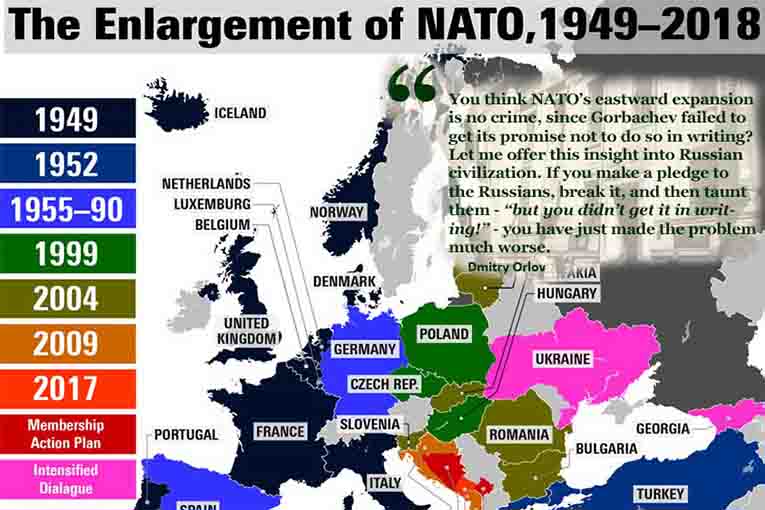
Self anointed and empire serving, ‘fact checker’ sites queue up to ‘debunk’ all talk of any such promises ever being made. I say the evidence is beyond refutation and such ‘fact checks’ are lies of Goebbelsian dimension. But why get bogged down in the “he saids” and “she saids”? The plain truth is that Washington would never tolerate a comparable threat within two thousand miles of America’s borders.
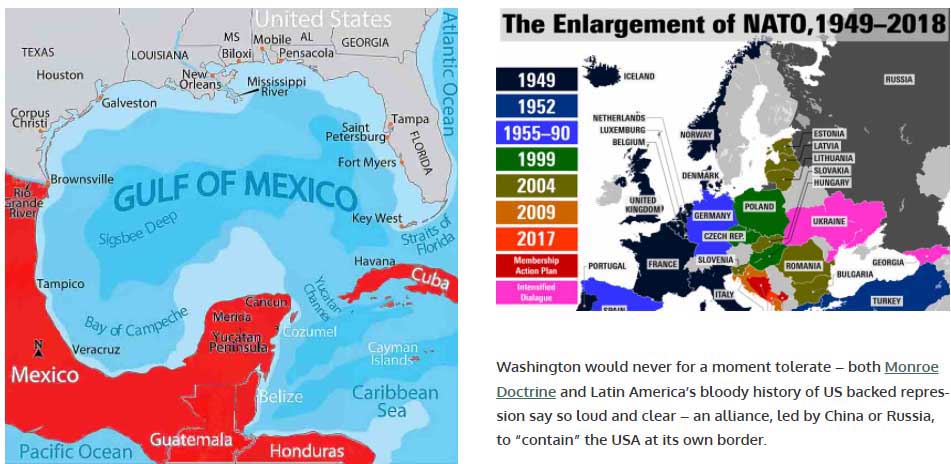
Simon, you go on to speak of:
Syria, where Barack Obama, burned by Iraq, failed to intervene in 2013 to stop the Assad regime’s use of weapons of mass destruction. How ironic is that?
Not only is evidence of the Assad regime’s use of WMDs – unlike that of Washington regimes’ use of depleted uranium and equally barbaric weapons – flawed. See for instance this account of the Douma incident, far more fact based than anything you have written here or elsewhere. (Earlier accusations of similar stripe are addressed in Monbiot, Syria and Universalism.) At the more general level of motivation to lie, and thereby manufacture anti-Assad sentiment in the West, France’s then Foreign Secretary Roland Dumas told of Syria being targeted for regime change as early as 2010.
That’s two years before the protests at Deraa and their hijacking by Islamists. When the Assad government cracked down – too slowly, in the eyes even of genuine protestors – Washington had its casus belli. Needless to say, the would be Gladstonians of Guardian stripe – with their usefully idiotic demands that “We” Do Something – played their part to perfection as planes, bombs and moderate Islamist terror were unleashed to darkly comedic folderol from the “it is with heavy heart” Book of Spin.
Yet despite a toxic mix – of (a) intrinsically flawed evidence, (b) Washington’s motives and form on deceiving us, (c) its unrivalled access to the means of mass opinion shaping – GMG and BBC no less than billionaire owned media reel out Syria tropes old and new, each lending specious credence to the next. These are elevated, by wall to wall repetition to a public seldom troubling to distinguish “we have evidence” from evidence, to the status of proven fact. On the very rare occasions when they are subjected to meaningful scrutiny in mainstream media, that scrutiny has come not from the avowedly progressive and vigilant Guardian but from men – like Peter Oborne (how the West funded terror in Syria) and Peter Hitchens (how the OPCW doctored Douma evidence) – in many ways the antithesis of ‘progressive’, who for all their conservative instincts put you and your liberal kin to shame by actually doing their job.
Evidently, the US often messes up. Yet do critics of American “hegemony”, deeply flawed, self-serving and arrogant though it undoubtedly is, really believe autocratic bullies such as Xi or war criminals such as Putin would do a better job as global policeman? Pull the other one, it has bells on.
No Simon. The thing with bells on is not your other leg. It’s the heady mix of whataboutery plus circular reasoning 5 plus meaningless hypotheticals in that paragraph.
Ideally, of course, a policeman should not be needed. But that, sadly, is not how the world is. An eternally divided UN security council cannot enforce its own rules and treaties. Regional organisations such as the EU, the African Union and Asean lack hard power when things fall apart.
I think by now you get my point, Simon. Your delusions of the US as global gendarme – when it has a record without parallel or precedent of tearing up every treaty it dislikes, every promise it deems no longer worth keeping, and of supporting every odious regime which in ways direct or tangential advances the rule of the dollar – beget the same hideously slanted take on each and every instance cited in your piece.
Europe has performed better than expected over Ukraine. But without US president Joe Biden’s intervention and almost $77bn in US assistance, 6 the war might have been lost by now. For all the talk of strategic autonomy, Brussels, as usual, looked to Washington for a lead. Germany refused to supply tanks to Kyiv unless Biden did so, too.
Here you (a) adopt a take on the Ukraine war which I have repeatedly shown – here and here for instance – to be false, as have many others; and (b) parade a failure to recognise how much Europe has been weakened, to the advantage of Washington, by that war.
One abiding mystery is why Putin, having occupied parts of Ukraine in 2014, did not launch his all-out invasion while Donald Trump was president. Given Trump’s obsequiousness towards his Kremlin pin-up, his anti-Europe and anti-Nato phobias and his recycled America first ideology, Putin could well have got away with it.
The puerile pugnacity of referring to Vladimir Putin as Trump’s pin-up is of a piece with that “Xi’s puppet” snidiness. Both are hallmarks of your style. But your implicit invocation of a Russiagate smear long discredited – even the Wall Street Journal admits this – crosses over from childish name-calling to mendacious propagandising.
We are oceans apart on hostility to NATO as a phobia – that term is reserved for irrational fears, not solidly grounded aversion to thermonuclear incineration – so let me just say that I too reject Trump’s “America First” stance. Not because of its retreat from the role of global cop you wish for the USA. Trump was arguing – justifiably, from a US ruling class standpoint – that America’s real enemy was not Russia but China. More fundamentally though, his America First-ism flowed from the misapprehension, shared by you, that imperialism is not a thing. In short, that he could ‘Bring US Jobs Home’ as if those jobs had not gone south for one reason alone; boosted profits for a US ruling class of which Trump was at best a fractiously junior, if occasionally perceptive, member.
I’ll stop here. There’s much more to be said but every error, gaping and criminally irresponsible, in your column has the same root. I identified it in the previous paragraph: elephant in the room blindness to the reality of an empire ruled by the most dangerous and blood-soaked regime on the planet. An empire – here’s another elephant analogy – all the more frightening for being wounded, perhaps fatally.
In which case it may yet take us all down with it.
Your piece was not opened up for comments, Simon. How brave of you.
* * *.
- One-sided accusations of whataboutery are not the only examples of empire-serving selectivity. See It’s only a conspiracy theory if anti-USA. And while I’ve no doubt that Simon Tisdall would call me an Assad, Putin and Xi apologist, I do doubt that he views himself as an apologist for the world’s most tyrannical regime.
- For reasons given here, I long ago abandoned my earlier and over hasty dismissal of claims that 9/11 was a false flag atrocity.
- I am for now staying with “Middle East” but the term is Eurocentric. “Western Asia” is better, even if it does have to be stretched to include North Africa.
- In The Shock Doctrine’s chapter on Iraq, Naomi Klein makes one error. In an otherwise impeccably researched appraisal of the dismantling of Iraq’s Ba’athist (“Arab socialist”) economy, in favour of a ‘wild west’ deregulation from which Anglo-US corporations profited hugely, she claimed that oil was left untouched as too glaring an asset grab. Subsequent revelations show that oil was assuredly not ‘left untouched’.
- At this point in Simon Tisdall’s indictment, the ‘autocratic bully’ status of Putin and Xi (where ‘authoritarian’ can for all practical purposes be read as “opposed to the oligarchs who rule the West”) serves both as accusation and its own proof. Mendacious, or simply obtuse? On the myriad fronts in which it arises, the question vexes me less with each passing year.
- To see just how absurd in its ignorance is Mr Tisdall’s talk of $77bn in US assistance, see the excellent piece by Bryan Gocke in Who pays for the US war machine?

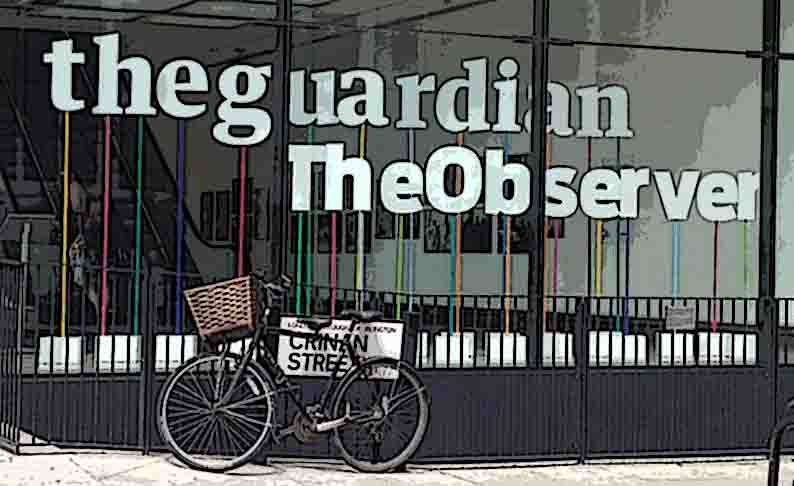
Excellent again. I gave up on the Guardian years ago because of the stuff Simon Tidsall & co churned out.
What amazes me is that presumably he believes what he writes. Maybe it’s another case where that Upton Sinclair quote applies. Would explain a lot.
I agree. I suspect, as I do with most Guardian hacks, self-serving credulity rather than consciously malevolent intent. Sometimes it’s hard to distinguish the two, and harder still to summon up the energy for such a task.
Thanks for your kind words.
You’re welcome.
But how do these people sleep at night? I hope, and surely as they’re human like us, they must sometimes be troubled at 3am by this.
It’s hard enough for those of us who bear no responsibility for all those dead people, but these people are cheerleaders for mass murder.
There’s a short clip I’ve seen on TV two or three times, it’s either in Iraq or Afghanistan, can’t remember which, of a young girl of about 10, standing outside her house with her family, crying, with US soldiers with weapons aimed at them while other soldiers ransack their home. The image of that girl stays with me.
I hope she survived.
Goodnight.
I think by becoming selectively stupid. The cackling, hand-rubbing lover of evil villain of Bond capers has little basis in reality. Humans have a need – driven I think by our dual nature as social yet individuated beings – to see ourselves as worthy. We also have a limited capacity for cognitive dissonance. When What We Do is too far at odds with our understanding of Who We Are, something has to give. If we’ve a functioning conscience and attendant capacity for shame, there’s always a chance of our changing what we do.
Failing that, we change our perceptions of what we do. The price being, again, that we become selectively stupid. I saw this in small ways in my fight with Sheffield Hallam University. I see it writ large whenever Tony Blair’s lips start moving.
Anyway, since you did ask – if only rhetorically – that’s my theory and I’m sticking with it till I hear a better one.
I’m reminded of this observation I came across in a BTL discussion on the Guardian site some years ago – in the days before everything not of The Official Narrative was censored:
Can’t remember who wrote it. Could have been a poster who went by the name of ‘Ellis’ (known on this site as bevin) at that time, if I recall correctly?
Them’s canny words, whatever their origin Dave
Pingback: Two short reads: Mary Mellor on ‘wellth’; Caitlin Johnstone on advertorial ‘journalism’ - steel city scribblings